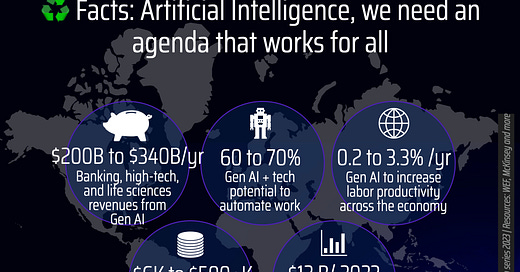♻️ Facts: Artificial Intelligence, we need an agenda that works for all
Facts and principles tips #2023-27
→ Generative AI is an engine of change in our economies and societies. Its rapid advancement in recent months emphasizes AI's critical role as the foundational infrastructure upon which the digital landscape will evolve — and highlights the crucial role of ensuring its responsible, ethical use.
→ Generative AI quickly synthesizes vast amounts of information to produce diverse content across multiple mediums, combining human-like creativity with technology. This emerging field offers numerous opportunities to revolutionize work across industries, automate tasks, foster creativity, and improve decision-making while providing humans with tools to help them progress.
→ However, it raises issues ranging from ethical concerns and notions of fairness to more profound debates about intelligence and fears about reaching the technological singularity, a hypothetical future in which technology becomes obsolete.
→ It raises concerns about ownership and intellectual property rights, open vs. closed models, the balance of innovation and safety, the tension between multilingual and sovereign national language models, and other issues. There is also the pressing concern that it will worsen the digital divide by unequal opportunities and resources distribution.
What we know/ what we need:
How can organizations implement generative AI use cases?
A "use case" is defined as a specific application of generative AI to a particular challenge of business that results in one or more measurable outcomes.
For example, a use case in marketing would be the application of generative AI to generate creative content, such as personalized emails, with measurable outcomes such as cost reductions and revenue increases from the enhanced effectiveness of higher-quality content at scale.
What are the potential impacts of generative AI on the work activities?
Generative AI could perform more detailed work activities such as "communicating with others about operational plans or activities."
This allows us to estimate how current generative AI capabilities might affect labor productivity across all work currently done by humans.
The World Economic Forum identified 63 generative AI use cases spanning 16 business functions that, when applied across industries, could generate annual economic benefits ranging from $2.6 trillion to $4.4 trillion.
→ We must prioritize safe systems and technologies by investing in robust and secure AI systems to ensure user safety and risk mitigation. Technical aspects include establishing shared terminology, benchmarks, and traceability, implementing responsible practices throughout development and deployment, and providing robust evaluation methods.
→ We must ensure long-term applications and transformation of generative AI by aligning it with long-term societal goals, addressing biases, and promoting transparency. It is critical to provide business and government leaders with the knowledge and foresight needed to effectively and responsibly harness the power of generative AI within their respective organizations while mitigating the risks that come with it.
→ Strong governance and regulation are essential. We need alliances and cooperation to work with policymakers and stakeholders to develop generative AI-specific ethical frameworks and regulatory measures.
→ These include evaluating societal impact, championing equity and inclusion, and co-designing essential governance blueprints to anticipate potential risks, guide development, and ensure a globally harmonized understanding of responsible AI practices.
Takeaways
♻️ Facts and principles tips
You are receiving this email because you signed up for Sustainability Insights by Yael Rozencwajg. Thank you for being so interested in our newsletter!
Facts and principles are part of Sustainability Insights, approaches and strategies.
We share tips to help you lead, launch and grow your sustainable enterprise.
Become a premium member, and get our tools to start building your sustainable enterprise: The Framework for Sustainability Conversations and The Sustainability Canvas.
Not a premium? Subscribe now and get 20% off on your first annual subscription.



